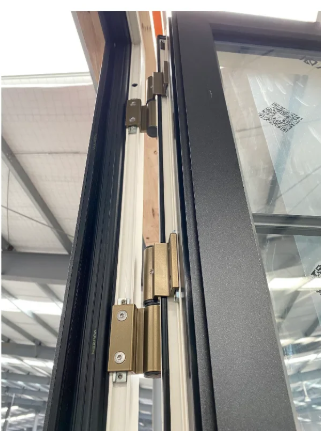In modern architectural design, windows are more than just elements for light and ventilation — they represent the perfect fusion of aesthetics and functionality. Among the many components of a window system, the hinge plays a crucial role despite its small size.
In particular, the Aluminum Alloy Window Hinge has become the top choice for residential, commercial, and industrial projects, thanks to its outstanding performance.

Why are aluminum alloy window hinges so important? What unique advantages do they offer compared to standard hinges? Let’s explore in detail.
What is an Aluminum Alloy Window Hinge?
An Aluminum Alloy Window Hinge is a mechanical connector installed between the window frame and sash, allowing smooth opening, closing, and positioning of the window.
These hinges are typically manufactured from high-strength aluminum alloys (such as 6061, 6063, or 7075 series) through die-casting or extrusion processes, followed by surface treatments like anodizing, electrophoresis coating, or powder coating to enhance corrosion resistance and visual appeal.
Depending on different window types and functional needs, aluminum alloy window hinges include:
- Standard casement window hinges
- Top-hung window hinges
- Friction hinges (with stay positioning)
- Concealed hinges
- Heavy-duty sliding window support hinges
Core Advantages of Aluminum Alloy Window Hinges
1. High Strength and Rigidity
Premium aluminum alloys, especially after heat treatment, exhibit excellent mechanical properties. Aluminum alloy hinges can bear significant loads, supporting large, heavy sashes (such as double-glazed windows) without deformation or loosening over time.
2. Excellent Corrosion Resistance
Aluminum forms a dense natural oxide film that protects against moisture, oxygen, and chemical corrosion. After additional anodizing or electrophoresis treatments, the hinge surface becomes even more resistant to wear and corrosion — performing reliably even in harsh coastal or humid environments.
3. Lightweight, Smooth Operation
Compared to traditional iron or stainless-steel hinges, aluminum alloy hinges are significantly lighter. This reduces the overall burden on the window frame and ensures easier, smoother window operation, while also extending the service life of the entire window system.
4. Versatile Surface Finishes and Aesthetic Appeal
Aluminum alloy hinges can be customized with a variety of finishes, such as silver anodizing, black, champagne, coffee, or gray powder coating — perfectly matching different window frame designs and architectural styles.
5. Environmentally Friendly and Sustainable
Aluminum is one of the most recyclable materials on earth, and its properties remain intact after recycling. Choosing aluminum alloy window hinges supports green building initiatives and sustainable development.
Manufacturing Process of Aluminum Alloy Window Hinges
Premium aluminum alloy window hinges typically go through the following production processes:
| Process | Description |
|---|---|
| Raw Material Selection | High-purity aluminum alloys like 6063-T5 are selected. |
| Molding and Forming | High-precision die-casting or extrusion molds ensure dense, defect-free structures. |
| Precision Machining | CNC machining for drilling, tapping, and deburring to achieve high dimensional accuracy. |
| Surface Treatment | Anodizing, electrophoresis coating, or powder coating enhances durability and appearance. |
| Quality Testing and Assembly | Each batch undergoes dimensional checks, load-bearing tests, and fatigue testing. |
Strict quality control at every step ensures the stability, durability, and consistency of each hinge.
Applications of Aluminum Alloy Window Hinges
Aluminum Alloy Window Hinges are widely used in:
- High-End Residential Projects: Villas, apartments, and townhouses that emphasize aesthetics and durability.
- Commercial Complexes: Office buildings, shopping malls, and hotels, requiring high strength and frequent operation.
- Public Facilities: Schools, hospitals, libraries, where safety standards and long-term durability are critical.
- Industrial Buildings: Warehouses and factories where low maintenance and environmental resistance are important.
- Coastal Constructions: Buildings near the sea where excellent salt-spray and corrosion resistance is essential.
How to Select the Right Aluminum Alloy Window Hinge?
When choosing a hinge, consider the following factors:
- Load Capacity: Ensure the hinge can safely bear the actual weight of the window sash with an additional safety margin.
- Window Type Compatibility: Different hinges are required for casement, sliding, or top-hung windows.
- Opening Angle: Standard options include 90° or 180°, with some hinges offering multi-stage positioning.
- Surface Treatment: Anodized finishes are suitable for indoor use; electrophoresis or powder coating is recommended for outdoor and coastal environments.
- Ease of Installation: Check if pre-drilled holes and matching screws are provided.
- Certifications: Look for products that comply with ISO, CE, SGS, or other international standards to ensure safety and performance.
Why Choose Our Aluminum Alloy Window Hinges?
As a professional manufacturer of door and window hardware, [Your Company Name] is dedicated to delivering high-performance, high-quality aluminum alloy window hinges worldwide.
Our key advantages include:
- Independent R&D and Customization: Tailored to different regional window systems and standards.
- Premium Raw Materials: Selected 6063-T5 or higher-grade aluminum for superior performance.
- Strict Quality Control: Each hinge is tested for over 50,000 opening and closing cycles to guarantee long service life.
- Diverse Surface Finishes: Meeting different market demands for aesthetics and durability.
- Fast Delivery and Excellent After-Sales Service: Strong production capacity and professional team support your business growth.
Conclusion
Though small, window hinges are critical to the stability, functionality, and safety of a window system.
Choosing a premium Aluminum Alloy Window Hinge not only enhances the window’s overall performance but also extends its service life and ensures building safety.
